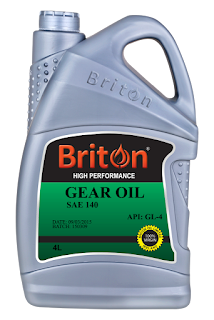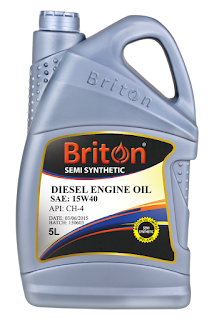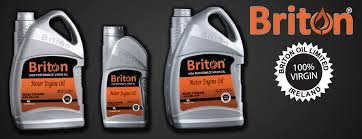Monday 21 December 2015
Motor oil, Diesel engine oil, Automatic transmission fluid, Gear oil, Hydraulic Oil, Brake Fluid, Motor Cycle Oil, Marine Oil, INDUSTRIAL OIL and Grease
Wednesday 25 November 2015
Rewards Of Synthetic Oils More than Typical Motor Oils
Numerous research have revealed that vehicles making use of
typical motor oils exhibit bad efficiency in low and substantial temperature
conditions. This is due to the fact these oils are manufactured up of an
inconsistent combine of atoms. The molecules oxidize, break and then evaporate
when the motor engine gets heated up in severe summer circumstances. Throughout
lower temperature situations, the significant carbon chains grow to be thicker,
increase the viscosity of the oil and do not permit it to flow properly. Motor OilLubricants can aid in such a
circumstance. With oils, your vehicles will give excellent mileage and
substantial-functionality.
Briton Oil Make
sure Extended Engine Existence
Synthetic oils consist of synthesized chemical compounds.
They can also be manufactured from modified petroleum items. They can be
utilised as an alternative of the traditional motor oil for vehicles running in
excessive temperatures. Automobiles, trucks and aircraft jet engines can use
them to increase their efficiency. Employing them, guarantees a right balance
among temperature and viscosity and offers greater stability and longer engine
existence. It eliminates the chance of oxidation and evaporation of quick
carbon chains in higher temperature locations. It lessens the danger of growing
the viscosity in incredibly reduced temperature regions. It not only improves
the racing performance of your vehicle but also has the advantage of fuel
economy.
Rewards Of Briton Oil About Traditional Motor Oil
* More rapidly Lubrication in All Temperatures: Briton Oil ensure faster lubrication of
the vehicle engine in all temperatures including severe temperatures. You will
not have any dilemma commencing your automobile even in extremely low
temperatures. Your automobile or truck will barely take time to begin if you're
employing them. On the other hand, conventional motor oil will get oxidized and
evaporated in substantial temperature and thickens excessively in low
temperature.
* Minimizes Degradation: The use of Briton Oil
minimizes the degradation of fuel as well as the engine. It does not
enable carbon atoms to either break or thicken and since of this, the engine of
your motor vehicle stays in very good condition and has a long existence. It
also ensures fuel effectiveness. Conventional oil does not function properly in
intense temperatures which sales opportunities to degradation of oil and also
affects the engine.
* Higher Engine Effectiveness: It is resistant to oxidation
thus lowering engine drag. It gives excellent racing overall performance in
substantial-speed circumstances. In addition, it consumes a lot less oil
although operating at a higher speed. Conventional motor oil impacts the
functionality of your vehicle and also minimizes its lifestyle span.
* Keeps Engine Clean: In contrast to conventional oil,
synthetic oil does not allow oxidation to take place. It provides enough safety
from dangerous deposits in the engine. It remains thoroughly clean all via and
gives optimum fuel effectiveness. Standard motor oil does not safeguard the
engine from harmful deposits. This is why the engine of your vehicle drags.
Briton Oil can be
employed any time in new cars. It is not essential to use typical motor oil
prior to employing it.
These days, the motor market is left with a quantity of DieselEngine Oil to choose from, of which, the full synthetic
motor oil is "hot". Not lengthy in the past, we had significantly
less than a 50 percent a dozen to decide on from. The 1970's ushered in an
array of lubricants: the synthetics, between which the full synthetic motor oil
occupies a dominant place.
Tuesday 24 November 2015
The Effects of Motor Oil on the Planet
Sometimes it seems like we are living in a catch-22
when it comes to how we use our planet. For one, we refine crude oil from the
earth to create motor oil to aid us in transportation around the planet. Yet
used motor oil can pollute our world if we are not careful with it. There are
numerous effects to motor oil getting into our air, soil, and water. As we
utilize this widely used fluid from Hydralic Oils UAE
and other organizations, we should be mindful of what it does not only for our
car but for the environment.
Water
Unfortunately, motor oil has a way of getting into our water supply. Car owners are usually the responsible party when they discard oil into garbage cans, down toilet and sink drains, and into storm drains and sewers. When we do this, water is transported to waste treatment plants and the local groundwater system. Motor oil is absorbed into streams, rivers, lakes, and other bodies of water, only worsening the problem. The oil creates a sheen, or a thin layer at the top. Oxygen exchange cannot take place in underwater animals and they perish. One gallon of water can be detrimental to millions of gallons of water.
Soil
Oil-affected water will seep into the soil. Plants come out of this soil and are damaged as a result. When animals eat these plants, they suffer the effects of the oil as well. There are several toxins in soil touched by oil. Lead, arsenic, chromium, barium, zinc, and cadmium are all metal materials found in contaiminated soil. These properties are poisonous and very dangerous. Scientists have also discovered polycyclic aromatic hydrocarbons, also known as PAHs in the soil. These carcinogens come from the combustion of used oil motor in a vehicle. PAHs are reported to disrupt the delicate balance of the ecosystem and the environment in general. FYI, used oil has 30% more PAHs than new motor oil.
Air
Motor oil is often reused as a cheap way to fuel a car. While this prevents harmful disposal, it can lead to emissions into the air. There are little fragments of heavy metal materials within the old oil. Gasoline and antifreeze are also found in the oil. The high pressure and temperatures lead to strong emissions. Copper, lead, zinc, and cadmium are released into the air in high and harmful amounts. That said, be sure you know to recycle used oil from Briton Oil Company.
Water
Unfortunately, motor oil has a way of getting into our water supply. Car owners are usually the responsible party when they discard oil into garbage cans, down toilet and sink drains, and into storm drains and sewers. When we do this, water is transported to waste treatment plants and the local groundwater system. Motor oil is absorbed into streams, rivers, lakes, and other bodies of water, only worsening the problem. The oil creates a sheen, or a thin layer at the top. Oxygen exchange cannot take place in underwater animals and they perish. One gallon of water can be detrimental to millions of gallons of water.
Soil
Oil-affected water will seep into the soil. Plants come out of this soil and are damaged as a result. When animals eat these plants, they suffer the effects of the oil as well. There are several toxins in soil touched by oil. Lead, arsenic, chromium, barium, zinc, and cadmium are all metal materials found in contaiminated soil. These properties are poisonous and very dangerous. Scientists have also discovered polycyclic aromatic hydrocarbons, also known as PAHs in the soil. These carcinogens come from the combustion of used oil motor in a vehicle. PAHs are reported to disrupt the delicate balance of the ecosystem and the environment in general. FYI, used oil has 30% more PAHs than new motor oil.
Air
Motor oil is often reused as a cheap way to fuel a car. While this prevents harmful disposal, it can lead to emissions into the air. There are little fragments of heavy metal materials within the old oil. Gasoline and antifreeze are also found in the oil. The high pressure and temperatures lead to strong emissions. Copper, lead, zinc, and cadmium are released into the air in high and harmful amounts. That said, be sure you know to recycle used oil from Briton Oil Company.
Monday 23 November 2015
Tips on choosing the best Diesel Engine Oil for Your Vehicle
One of the diesel
engine oil's many primary function, as most, will know, is to lubricate the
engine, providing a micro-thin oil film, acting as a barrier between the many
internal moving parts to minimize friction, heat build-up and of course, wear
and tear. It also acts as a cooling agent, carrying away heat generated from
the friction to the oil sump. The Diesel
Engine Oil helps to prevent contamination and deposit build-up by leading
away debris and dirt from the critical areas within an engine to the oil filter
where they will be trapped. Damaging toxic waste is going to be neutralized by
the detergent present in the engine oil to arrest corrosion and rust.
However, all good
things must come to an end and so do Diesel engine oils. Constantly subjected
to heavy loads, the Motor Oil will
eventually break down, and with that, its protective cleaning and cooling
properties will also start to diminish. As for the useful lifespan of the
engine lubricant, it depends mainly on the type of oil (mineral, semi-synthetic
or fully synthetic) and the "abuse" that it will encounter. A general
rule of thumb is that mineral oil will last around 5,000 km, semi-synthetic
7,500 km and fully synthetic 10,000 km.
What makes oil
mineral, semi-synthetic or fully synthetic? On the whole, lubricants are made
up of a base or stock fluid, which constitutes most of the finished product,
and additives. If the base is derived from petroleum crude oil, the engine oil
will be of the "mineral oil" category. On the other hand, oils using
stock fluids developed in the lab from chemical synthesizing will be of the
fully synthetic nature. Semi-synthetic oil is, to simply put it, a blend of
mineral oil and fully synthetic oil.
The two most important
bits of information that one should check when selecting diesel engine oil for
your car are its SAE (Society of Automotive Engineers) viscosity grade and the
quality indicators of engine oil.
The viscosity of oil
refers to its "flow ability", and it changes with temperature. At low
temperatures, an oil's viscosity is high (thick), dipping (thins out) as the
temperature climbs. Unfortunately, the requirements asked of an engine
lubricant are just the opposite. Engine needs low-viscosity diesel engine oil -
which circulates much more quickly than high-viscosity oil - at cold so that
the oil can reach all parts of the engine in as short a time as possible,
protecting the components from wear. For the uninitiated, most of the engine
wear occurs during start-up. During normal operation, the engine needs a
sufficiently thick oil film to properly protect its fast moving components and
thus the need for high-viscosity oil. This is where Briton oils come in.
Briton oils are
created by the process of adding a polymer to a light base oil to prevent the
oil from thinning too much as it warms up. When cold, these polymers will coil
up and allow the oil to flow as its low viscosity grade, accompanied by a
"W", indicates. Once warmed up, the polymers unwind into long chains
that prevent the oil from thinning as much as it normally would. The result is
that at 100 degrees C, the oil has thinned only as much as it's higher rating.
For example, multi game 5W-40 oil is a 5-weight oil that will not thin more than
a 40-weight oil when it gets hot.
As for quality
indicators, the key indicator to look out for when selecting diesel engine oil
is the API (American Petroleum Institute) Service Classification mark indicated
on the bottle. Oils are subjected to tests and standards have to be met before
these oils are accredited. This mark indicates the quality of the oil and thus
should be factored in during consideration. API uses the S and C categories for
vehicles with petrol and diesel engines respectively. For the former, starting
from SA, the current and latest standard is SM.
But to really
differentiate between the good and the average Diesel Engine Oil, your best bet would be the data sheet of the
oil, where its pour point and flash point information can be found. Pour point
refers to the lowest temperature at which the oil will still pump and maintain
adequate oil pressure, while the flash point is the temperature at which the
oil gives off vapors that can be ignited with a flame held over the oil. In our
local climate, the pour point is not that significant compared to the flash
point. The flash point is sometime the indicator of the quality of the base
fluid used.
It is best to consult
your owner's manual for the recommended grade of oil suited for your car and
climate. Thinner oils with ratings such as 0W-30 and 5W-30 are usually
acceptable for newer cars, while for vehicles getting on in age; thicker oils
are more suitable due to the reduced sealing of piston rings and larger bearing
clearances within the engines. After narrowing your choice of oil to a select
few of the appropriate viscosity for your application, base your final decision
on the oil with the highest flash point.
It is imperative that
the engine oil level is monitored regularly lest it goes above or dips below
the "max" and "min" marks respectively, leading to
undesirable consequences. Diesel Engine Oil
may or may not be consumed by the engine in between oil change services. For
extended smooth-running operation of your vehicle, be sure to pamper it with
regular engine oil change.
Subscribe to:
Posts (Atom)














































